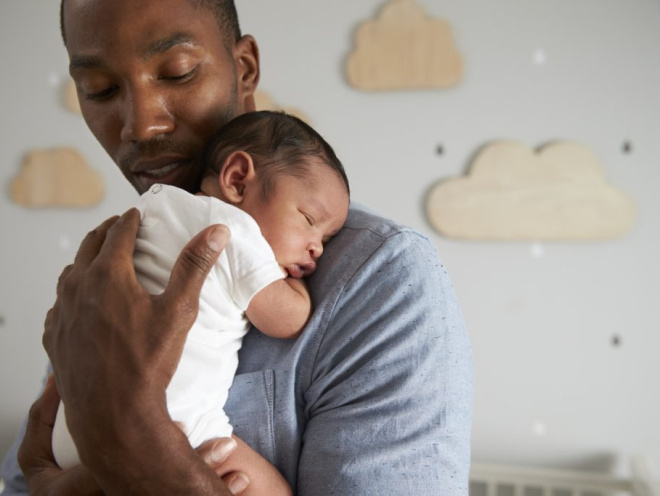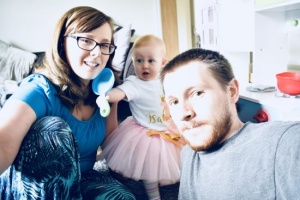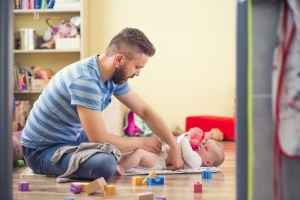Becoming a first-time parent can be one of the biggest changes people experience. Read on to find out about common challenges and tips for managing them.
Welcome to the biggest change of your life – having a baby. There’s no doubt that the transition from being a partner to becoming a parent can be challenging (NHS, 2019). It is probably going to affect relationships with your partner, friends, family members and work colleagues (NHS, 2019).
Research has shown that new dads and other co-parents can feel emotionally and physically detached during the transition to parenthood (Chin et al, 2011a). It can be a period where you start to see yourself differently, developing your sense of self; this time may also redefine the relationship with your partner (Chin et al, 2011b).
It can take a while for some new dads or co-parents to gain a sense of confidence and control with parenting (Kowlessar et al, 2015). For some, becoming a dad or co-parent can bring a range of negative feelings, fears and stress (Freitas et al, 2016). Becoming a dad or co-parent can also bring positive emotions: from the rewards of learning what your baby needs and bonding with your baby, to working as team with your partner (Baldwin et al, 2018).
The relationship with your partner
It is normal for the relationship with your partner to face some challenges in the early days as you get used to looking after your new baby, new responsibilities and dealing with sleep deprivation. Many new parents say that they feel closer after the birth of their baby. But it’s not unusual for even the strongest of relationships to feel the strain at times, particularly when both parties are frazzled by a lack of sleep (Relate, 2016).
It’s important to nurture your relationship, as this is going to be one of the best support systems for you and your growing child in the future (NHS, 2019). It can help to focus on things that make you enjoy being a couple – whether that’s watching a film or going for a walk. It might mean you have to get someone else you trust, like a grandparent, to look after your baby for a couple of hours. But it’ll be well worth it.
Inevitably, there will be changes in the physical side of the relationship too. Neither of you may feel like having sex for a while after your baby is born due to tiredness, your partner’s physical recovery after birth and shifting priorities (NHS, 2018). Read more about sex after having a baby in our article here and there are more articles about relationships here.
Adjusting to your role as a dad or co-parent: it’s good to talk
You are likely to have concerns about what kind of parents you want to be and how you might handle disagreements over parenting. Pregnancy is a great time to take time to talk before you have a little human being vying for your every waking moment. And if you have some skills beforehand in terms of conflict management, these are invaluable once the baby comes (Machin, 2018).
In the early days of being a new parent – and indeed after this too – try to be open with your partner and acknowledge you’re both doing a good job. You’ll also have different experiences, especially if one has returned to work and the other is at home with the baby. So you could tell each other about them – your partner is probably more interested than you think in what you’ve been up to all day.
Sleep deprivation
Your sleep will be impacted by having a new baby in the home and this can affect wellbeing and mood but try not to get into exhaustion one-upmanship. It’s easy to get into a ‘competition’ about who’s the most tired or who’s had the worst day. When you do this, you pit yourselves against each other and it can feel like you’re not on the same team (NHS, 2019).
Let’s face it – with a new baby, no one’s having an easy ride. Instead, focus on the positives when things are going well and make sure your partner knows you appreciate what they are doing for your family (NHS, 2019).
Whatever you do, keep talking to your partner and tell them about any issues you’re going through. That way you can tackle them together before they become too big. This will help keep your relationship on track (Relate, no date).
New tasks and responsibilities
Dads and co-parents can feel sidelined or even unsure when it comes to their baby if the mum or other parent is now focused on their little one or spending more time around them (Hodkinson and Das, 2021). What’s more, you might find your transition to being a parent is different from your partner and each face different challenges and concerns.
Think about how friends and family can support you and your partner in your new roles as parents. Could they help with household chores or watch the baby for you? This may help take some of the strain from your both and even enable you to spend some time as a couple.
Bonding with your baby
It’s important for dads and co-parents to have a chance to bond with their baby too, so try to get involved when you can with everything from changing to bath time. Dads or co-parents can change, bath and soothe the baby, or sing, read and play, while mum has some time away, and vice versa (Relate, no date). Then you can allow each other ‘me time’ so you both have a break.
Read more about how dads and co-parents can bond with their baby here.
Lifestyle changes: maintaining friendships as a new dad or co-parent
With lazy weekends, social outings, and meals out relegated to a distant memory for a while, your identity may change as you incorporate being a parent. Couples may find the dynamics of their relationship change too (Machin, 2018).
You might find you’re less interested in nights out and more inclined to spend time at home (Machin, 2018), although you probably don’t want to forget your old friends completely. Many new dads and co-parents find that their friends are an invaluable source of support (Mind, 2020). So although it might seem like an effort to maintain any sort of social life, try not to let old friendships slip entirely (NHS, 2019). You might be exhausted or just want to get home to see your baby and partner, but try to keep in touch with pre-baby friends.
Some people may understand and many co-parents say they pick up where they left off when they do see each other. Other co-parents notice a growing distance with friends. As hard as it can be, try to tell them about what you're experiencing as a new parent and that you need their support (Mind, 2020). They may open up about their own stresses and you may understand each other better.
Finding peer support: hanging out with other new parents
It’s a great idea to join an antenatal or postnatal course and meet expectant or new dads or co-parents in exactly the same position as you. New parent friends can help you realise you’re not alone. The common ground – and swapping stories of your baby’s sleeping habits and bowel movements – can also make it easier to bond!
There can be so many worries for parents, which is why it’s even more important to get support from every possible avenue (Fatherhood Institute, 2010; Mind, 2020). The huge new responsibility may be weighing on your mind, along with anxieties over what sort of parent you’ll be and pressure to be a perfect parent.
Of course, for dads or co-parents who are returning to work, it can be hard to find the time to meet up with friends to discuss how they’re feeling. If it is hard to meet up with old or new friends, there are many online resources (such as those below in Further information), which fit well into busy lives (Machin, 2018).
Work–life balance
For many new dads and co-parents, at some point you will need to juggle your new role with employment. Some find this quite straightforward and enjoy being able to the have the normality and routine of work as an escape from parenting duties. While others find leaving their baby at home difficult as they miss them and want to be more involved in their care.
For dads and co-parents who find balancing the responsibilities of being a parent and working difficult, this can be the driving force for tackling the thorny issue of getting the right work–life balance once and for all (Kaufman, 2013; McLaughlin and Muldoon, 2014).
If your baby hasn’t arrived yet, you may like to consider how long to take for parental leave to help you and your partner adapt to life with your new baby. There is also the option of shared leave for many families. Here, one dad talks about juggling life as a new dad.
Don’t forget how vital you are
The most important thing to remember is that being a dad or co-parent is a hugely important and unique role. The fact is, each parent has a different parenting style that compliments the other. This is crucial for their baby’s development (Machin, 2018). It teaches your growing child that there are different personalities in the world and how to relate to them.
Of course, no one is pretending that being a parent isn’t incredibly hard work. Hopefully, with the right help and support, dads and co-parents will find it easier to cope, share their feelings and adapt to their new life as a parent.
If you feel that your mental wellbeing is being affected, try opening up to your partner, friends of family. Dads and co-parents have perinatal mental health problems just like new mums do.
This page was last reviewed in January 2022.
Further information
Our support line offers practical and emotional support with feeding your baby: 0300 330 0700.
You might find attending one of our NCT New Baby courses helpful as they give you the opportunity to explore different approaches to important parenting issues with a qualified group leader and other new parents in your area.
Make friends with other parents-to-be and new parents in your local area for support and friendship by seeing what NCT activities are happening nearby.
To connect with information and support for new dads or co-parents, you could look at the following online resources:
Baldwin S, Malone M, Sandall J, Bick D. (2018) Mental health and wellbeing during the transition to fatherhood: a systematic review of first time fathers’ experiences. JBI Database System Rev Implement Rep. 16(11):2118-2191. Available at: https://doi.org/10.11124/JBISRIR-2017-003773
Chin R, Daiches A, Hall P. (2011a) A qualitative exploration of first-time fathers' experiences of becoming a father. Community Pract. 84(7):19-23. Available at: https://pubmed.ncbi.nlm.nih.gov/21941706/ [Accessed 25th January 2022]
Chin R, Hall P, Daiches A. (2011b) Fathers' experiences of their transition to fatherhood: a metasynthesis. J Reprod Infant Psychol. 29(1):4-18. Available at: https://doi.org/10.1080/02646838.2010.513044
Fatherhoood Institute. (2010) Fathers and postnatal depression. Available at: http://www.fatherhoodinstitute.org/2010/fatherhood-institute-research-summary-fathers-and-postnatal-depression/ [Accessed 25th January 2022]
Freitas CJ, Williams-Reade J, Distelberg B, Fox CA, Lister Z. (2016) Paternal depression during pregnancy and postpartum: An international Delphi study. J Affective Disord. 202:128-136. Available at: https://doi.org/10.1016/j.jad.2016.05.056
Hodkinson P, Das R. (2021) New Fathers, Mental Health and Digital Communications. Palgrave Pivot.
Kaufman G. (2013) Superdads. University Press, New York.
Kowlessar O, Fox JR, Wittkowski A. (2015) First-time fathers’ experiences of parenting during the first year. J Reprod Infant Psychol. 33(1):4-14. Available at: https://doi.org/10.1080/02646838.2014.971404
Machin AJ. (2018) The Life of Dad: The Making of the Modern Father. Simon & Schuster UK, London.
McLaughlin K, Muldoon O. (2014) Father identity, involvement and work–family balance: an in‐depth interview study. J Community Applied Soc Psychol. 24(5):439-452. Available at: https://doi.org/10.1002/casp.2183
Mind. (2020) How can other people help? Available at: https://www.mind.org.uk/information-support/types-of-mental-health-prob… [Accessed 25th January 2022]
NHS. (2018) Sex and contraception after birth. Available at: https://www.nhs.uk/conditions/pregnancy-and-baby/sex-contraception-after-birth/ [Accessed 25th January 2022]
NHS. (2019) Relationships after having a baby. Available at: https://www.nhs.uk/conditions/pregnancy-and-baby/relationships-after-a-baby/ [Accessed 25th January 2022]
Relate. (2016) Key relationship stats. Available at: https://www.relate.org.uk/policy-campaigns/relationship-statistics [Accessed 25th January 2022]
Relate. (no date) How to maintain a healthy relationship after a baby is born. Available at: https://www.relate.org.uk/relationship-help/help-family-life-and-parent… [Accessed 25th January 2022]








